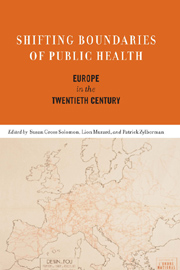Introduction
Published online by Cambridge University Press: 12 September 2012
Summary
The twentieth century dawned auspiciously. Path-breaking developments were occurring in many fields of arts and culture. It had been nearly three decades since a major European war. There was little reason to predict that, alongside the great advances in thought and sensibility, the new century in Europe would bear witness to unprecedented carnage carried out by the “gardening state” in the service of one or another ideology or vision of modernity. But before the century had come to an end, on both national and international levels, a variety of political structures (liberal democratic, authoritarian, totalitarian) would be essayed in the name of expanding and circumscribing the reach of politics. The twentieth century, termed by Hobsbawm an “age of extremes,” has left a legacy that de? es neat categorization and continues to fuel heated debates.
Public health was deeply implicated in the mixed record of the century. The advances in science made possible almost unimaginable progress in the conquest of contagious disease, while new ways of thinking about social citizenship and economic progress bolstered the view that the health of the body politic was the concern of the state. At the same time, public health (and medicine) played a seminal role in a range of ruthless and heinous human experiments—all in the effort to construct societal utopias.
With belief in the link between the structure and substance of policy making widespread, new organizations for making health policy were created.
- Type
- Chapter
- Information
- Shifting Boundaries of Public HealthEurope in the Twentieth Century, pp. 1 - 20Publisher: Boydell & BrewerPrint publication year: 2008

